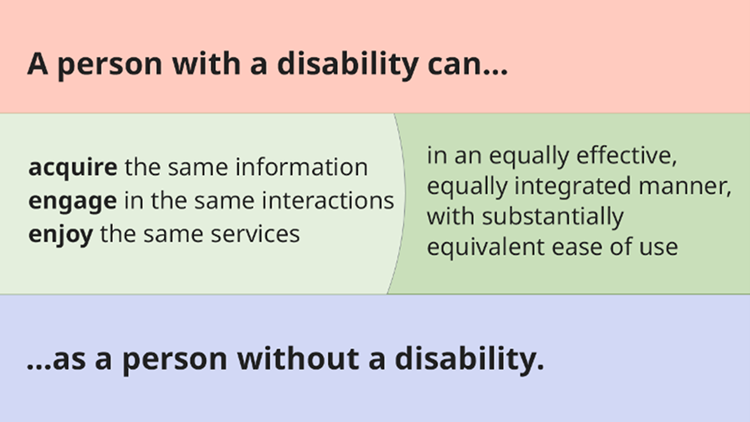Why Accessibility is Important
ACCESSIBILITY IS BOTH ESSENTIAL AND USEFUL
Faculty, staff, and students are often unsure of what we mean when we speak of web accessibility. Web accessibility is an issue that is relevant to all people, not just for those with a disability. Understanding, using, and planning for web accessibility can be overwhelming, and full compliance is best approached as a gradual journey. To be most effective, web accessibility must be addressed proactively, and involves educating oneself about accessibility, creating accessible content, and making that content readily available to all online users.
WHAT IS ACCESSIBILITY?
“Accessibility is shaped by what we need to do, our interactions with the environment, and our personal preferences.”

Center for Applied Special Technology (CAST)
According to CAST, content is considered accessible if a person with a disability can…
- Acquire the same information
- Engage in the same interactions
- Enjoy the same services
In an equally effective, integrated manner, with substantially equivalent ease of use as a person without a disability.
This means ACCESS. Digital accessibility strives for inclusive design that allows anyone to use, engage and enjoy digital content regardless of the level of ability, condition, or circumstances. It focuses on eliminating barriers that can block a user’s access to digital content and taking an active approach to creating a fully inclusive website for everyone, including people with visual, cognitive, physical, and auditory disabilities.
why Does ACCESSIBILITY Matter?
There are at least four primary reasons why accessibility is important and should matter to us:
#1: IT’S INCLUSIVE AND gives EQUAL ACCESS to all.
#2: IT PROMOTES USABILITY.
When we consider accessibility in our online content design, it also enhances usability, and often results in a more intuitive user experience. Online content that meets accessibility requirements is likely to be more user-friendly for everyone. People without disabilities can benefit from accessible design, particularly when they are in limiting situations such as:
- Reading captions for a video when in noisy or quiet environments
- Adjusting screen brightness in a dark or bright room
- Reading a transcript of a presentation to reinforce the information learned
- Using the keyboard to navigate a website when the mouse is not working
#3: IT’S THE RIGHT THING TO DO.
Accessibility allows people with disabilities to actively participate in our society. In addition to being leaders of innovation and progress, institutions of higher education are also regarded as having a certain level of responsibility to society. Accessibility supports this notion as well as UNCG’s mission.
#4: IT’S THE LAW.
There are many federal and state laws that require higher education institutions to make their electronic and web content accessible to people with disabilities. Violating these laws can result in a loss of funding (including federal financial aid funds), as some universities have faced legal action for web accessibility non-compliance. More information about these laws can be found on the Laws & Guidelines page.
WHO BENEFITS?
IT’S BETTER FOR SOCIETY AND EVERYONE.
Accessible online content means that everyone is included—no one is left out of receiving your message. Inclusive messages means that we can all participate and receive the same information. It benefits society by allowing more people to be actively involved, contributing their ideas and point of views.
IT MAKES SENSE FINANCIALLY.
Accessible websites and online content are more likely to attract a wider audience of potential users. For UNCG this means expanding its reach into a variety of areas, which could lead to an increase in website visitors, enrollment in courses, use of services, and more.
Also, accessible websites have higher search engine optimization. This means that accessible websites are ranked higher and will be closer to the top of Google, Yahoo, or another search engine. It is also less expensive to build an accessible, standards-compliant website at the start, rather than going back and redesigning it from the ground up.